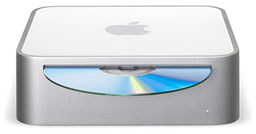Here we are, almost six months after the day hell froze.
We all remember it - the out of the blue announcement, the
disbelief. Intel on Macs.
Admit it, no one saw it in a positive way. Even those that were fed
up with the continuing delay of the PowerBook G5 felt numb at the
thought of Intel.
The days after the keynote, the FUD was spreading fast. PC users
talking about the end of the Mac, and Mac users talking about the end
of the Mac. (See Apple pulls
the ultimate switch with Intel embrace, The Register,
2005.06.06.)
Think of it: This is the second time the Mac had died in five years,
according to some people (the first time was when OS X was
introduced).
The "serious" people were predicting the same thing, but from a
different point of view: The impact on Apple's financial status. The
"Osborne
effect" became a term of our everyday life.
Everyone predicted that people would suddenly stop buying Macs until
the Intel-based ones were introduced. Apple had made a huge mistake. It
would mean the end of Apple.
 That, that, that...
That, that, that...
Well six months later the sales figures show that Mac hardware sales
are going strong - stronger than ever!
Windows users are even more attracted to the idea of getting a Mac
OS X machine. After all, Intel-based Macs will allow them an
easier switch, as they will be able to dual-boot (and play Doom 4
also). Many of them tried the "leaked" version of OS X for Intel -
and they liked it.
Software developers are happily announcing that porting their
applications to x86 Macs is easy. In many instances it just requires a
tick of a checkbox in their compiler software.
Apple is expected to launch Intel-based Macs five months
before their anticipated June 2006 appearance.
Times change. No more delays. New models arrive on time - and maybe
even sooner!
All this generated a lot of free publicity. For the first time it's
mentioned in mainstream media that Tiger (OS X 10.4) already has
more features than Windows Vista is going to have next year.
Things sure look good. For the first time in over 15 years, Apple
has the initiative.
But let's recap what has changed since 2000 (the year Macs were
going to die...)
- Five years ago, Mac OS 9 was lagging behind Windows. Today Windows
is trying to catch up with Mac OS X.
- Five years ago, Apple was getting very little media attention.
Today (thanks to the iPod also) everything related to Apple is big
news. The Mac mini, iMac G5, and Tiger got impressive mainstream media
coverage.
 Five years ago, it was quite
expensive to get a new Mac (US$799 for a 350 MHz G3 iMac that
couldn't even burn CDs). Today you can get a Mac mini for US$499.
Five years ago, it was quite
expensive to get a new Mac (US$799 for a 350 MHz G3 iMac that
couldn't even burn CDs). Today you can get a Mac mini for US$499.- Five years ago, PowerPCs were starting to lag behind x86. Today
Apple has ensured that they will be on par with the rest of the Intel
world.
- Five years ago, Apple wasn't even sure about the availability of
faster G4 CPUs. Today it has a contract with the biggest supplier in
the world. It's more likely that oil will run out soon than Intel will
stop making chips.
- Five years ago, Apple's market share was at an all-time low. Today
it's growing day by day.
- Five years ago, Apple was still slowly recovering from the "stone
years". Today Apple is one of the most healthy personal computer
companies financially.
All these things don't say much about the platform wars. They do say
that OS X will be a viable and vital alternative computing
platform for years to come.
And that is all that counts.


 That, that, that...
That, that, that... Five years ago, it was quite
expensive to get a new Mac (US$799 for a
Five years ago, it was quite
expensive to get a new Mac (US$799 for a 
